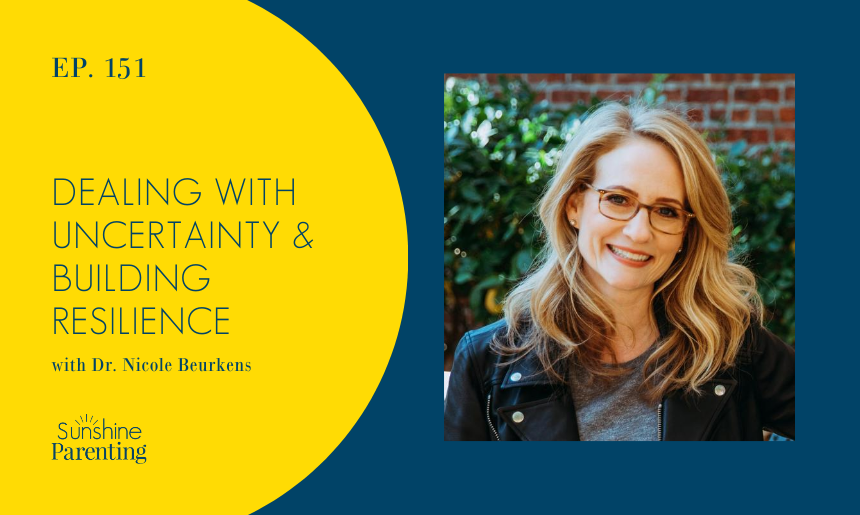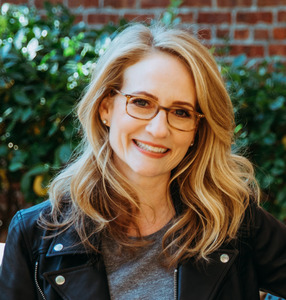

Dr. Nicole Beurkens
My guest this week is Dr. Nicole Beurkens. As a licensed clinical psychologist with advanced degrees in psychology, education, and nutrition, Dr. Nicole Beurkens is the world’s leading holistic child psychologist. She has dedicated her 22+ year career to providing parents with research-based strategies that get to the root of children’s attention, anxiety, mood, and behavior challenges so they can reach their highest potential. She runs a multi-disciplinary evaluation and treatment clinic and is a best-selling author, published researcher, award-winning therapist, and experienced mother of four.
Big Ideas
One of the best things we can do for our kids is stay grounded ourselves and model that for them.
There is often not a “right” or “wrong” choice. It’s important to look at what is best for your family to help you decide.
It’s important for kids to have independent time either by themselves or with their siblings.
It’s helpful to pay attention to our coping skills and model healthy ones for our family that do not always involve screens.
Quotes

Dr. Nicole Beurkens: Parents and kids are now facing starting a year in a really different way. And just the uncertainty of that is generating a lot of anxiety and a lot of distress for kids. But I would say even more so for parents. I get asked all the time, “What do we do for the kids? What do we do for the kids?” And the reality of it is it’s really how we’re dealing with it as parents that sets the tone for how our kids deal with it.
Dr. Nicole Beurkens: The first thing is to realize exactly what we’re talking about—that the tone that we set as adults, as parents really makes the most difference. If we’re able to manage our own emotions and behaviors around this in healthier ways, that really goes a long way to helping kids do that.
Dr. Nicole Beurkens: We need to figure out how to keep ourselves more stable and more regulated.

Dr. Nicole Beurkens: We need to find some time to ground ourselves and to help ourselves through the feelings and the things that are going on for us.
Dr. Nicole Beurkens: It’s super healthy and important for kids to have time when an adult is not structuring or generating and initiating activities.
Dr. Nicole Beurkens: Please realize you can step back and take some time to do the work catch-up that you need to do, to sit down with a book and a cup of tea for a few minutes, if that is soothing to you, to go out and take that walk, to do the things that help keep you healthy—your kids can go navigate that time by themselves.

Dr. Nicole Beurkens: Ultimately what happens is they start to find things to do. And that’s really where an increase in creativity and self-generated activity and initiative comes from is when we allow them to have times where they have to figure it out either independently or with their siblings.
Audrey Monke: I think part of it is that when both parents work outside the home, I think what they’re used to is when the time that they are home, maybe it’s dinner time or whatever, it’s very concentrated family time. So I think this shift when your kids are always there, maybe that’s an issue that people think, “Oh, it’s supposed to always be this like full on work.”
Dr. Nicole Beurkens: Screens do not always have to be an option for kids and shouldn’t always be an option for kids. And in fact, they should have times during the day when they’re not options and there’s other things they need to do.

Dr. Nicole Beurkens: It’s so true that very often now for kids their default, if no one is engaging them in something, is just passive screen time kinds of things. So we need to be intentional about setting times and spaces where that’s not happening and here’s the secret to that: 100% expect they will not like that. And that is okay. It is totally okay.
Dr. Nicole Beurkens: It’s something I’m seeing in a lot of older teens and young adults now in my practice that they have not learned how to tolerate uncomfortable feelings, how to be with themselves and their own thoughts because their generation has just grown up sort of defaulting to using passive scrolling through social media or, you know, doing things online and on their devices as a way to kind of numb that. And while that works in the short term, it is not a good longterm strategy and it’s not a strategy for helping kids grow up to be more resilient, to be emotionally and behaviorally regulated.
Dr. Nicole Beurkens: Now you may be on the computer for many hours a day for work related things, but to even be intentional about things like device-free meal, times to be intentional about when I’m doing something with you, playing a game, taking a walk, doing some kind of play with you. I don’t have my devices there. To be intentional about your children seeing you doing activities and things where you’re taking a break from the devices where they’re not part of the picture, seeing you doing things for yourself to relax and engage in self-care without resorting to devices. Those are really important models. And I think those are far more powerful than the things that we tell them about.
Dr. Nicole Beurkens: That’s the thing we’ve had conversations with the kids about. Okay, let’s think about all the possible scenarios. And let’s just kind of think through some plans for that. And I think that’s really helpful strategy for parents and kids to be doing. Especially if you have kids at those milestone kinds of situations.
Dr. Nicole Beurkens: I think what that does in thinking that through is it just brings that anxiety down because anxiety is all about uncertainty and about things that we can’t control. And while we can’t control those things, just by thinking through and making some plans and having like a Plan A, a Plan B a Plan C and even just talking through and anticipating how that will feel and how we’ll respond to that. That’s a really productive way of helping kids process and work through those emotions.
Audrey Monke: I think all of us need to be flexible and that’s in workplaces, in families, in schools, teachers, everyone, because like you said, everyone’s kind of doing the best they can.
Audrey Monke: We’ve all been talking about mindfulness and how important that is, but it’s almost like we’re being forced now to be aware and totally better with what is going on inside of us. I think when you slow down, all the stuff comes up.
Dr. Nicole Beurkens: A lot of our typical coping strategies have been taken away because at least in the United States, a lot of the default coping is to stay busy.
Dr. Nicole Beurkens: What are the silver linings here? Or what are some of the benefits?
Dr. Nicole Beurkens: Nothing that’s going to happen is all bad.
Dr. Nicole Beurkens: As families and as parents, we can support each other and realize that there is no right or wrong, there are options. And you need to look at what is in the best interest of your family’s health, wellness, wellbeing.
Audrey Monke: Like you said, you can pivot if it seems like it’s not working.
Links
Dr. Beurkens’ Website with resources for parents and professionals
Horizons Developmental Resource Center
One Simple Thing
More of, Less of, Same of (MO, LO, SO)
My Favorite
Creating moments during COVID (surprise camp blanket & jacket presentations):
